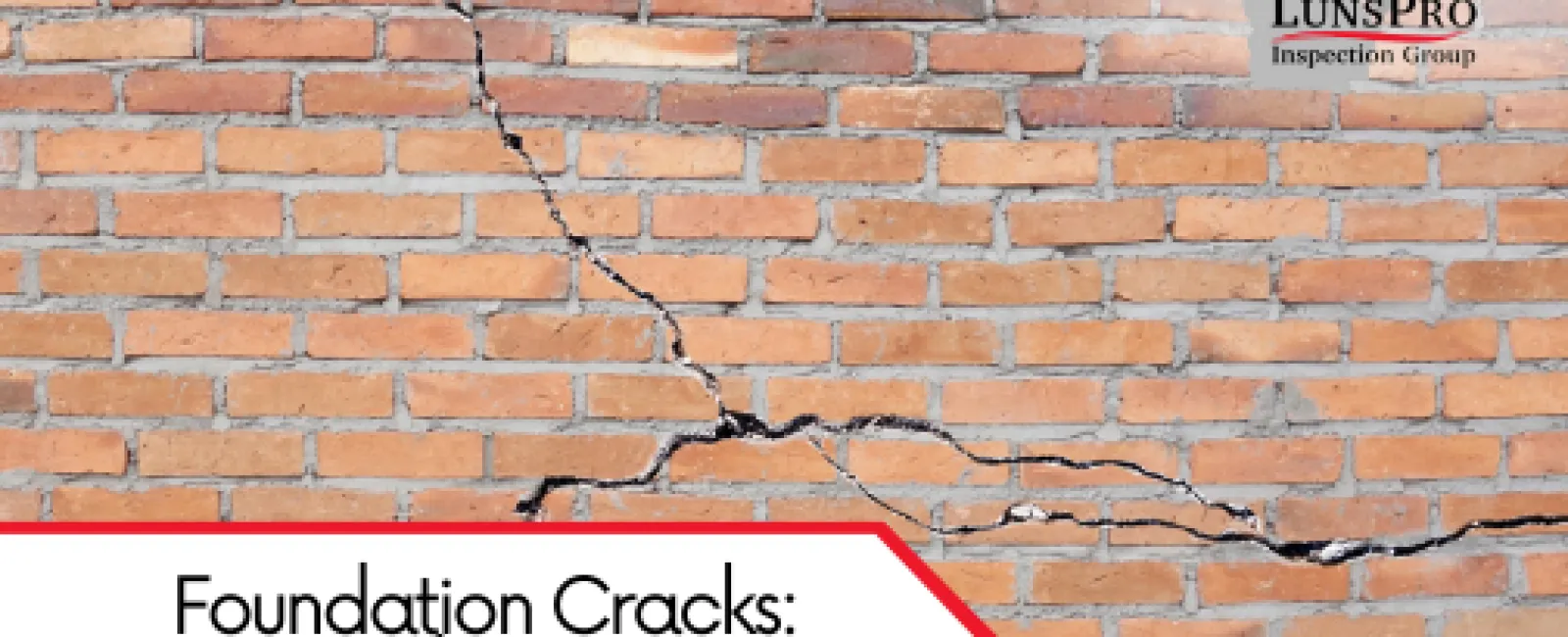When you spot a crack in your home's foundation, it's easy to assume it's just a cosmetic issue—something to patch up and forget. However, foundation cracks are often far more significant than they appear. While some may indeed be minor, others are early warning signs of structural damage, water intrusion, or soil movement beneath your home. Knowing the difference between harmless and hazardous cracks is critical for protecting your property.
At LunsPro Inspection Group, we often encounter foundation cracks during Atlanta, Alpharetta, and Athens Residential and Commercial Inspections. These cracks may be visible from both the inside and outside of basements or crawlspaces, and they almost always warrant professional evaluation. For homeowners seeking dependable Georgia home inspections, understanding the causes, risks, and solutions surrounding foundation cracks can make the difference between a safe, stable home and one facing long-term structural challenges.
Why Foundations Crack
Foundations are built to last, but they are not immune to environmental stress. Cracks develop for many reasons, and while not every crack spells disaster, every crack does tell a story about what's happening to your home.
Common causes include:
Soil Movement: Georgia's clay-heavy soils expand and contract with moisture, creating pressure on foundations.
Water Intrusion: Poor drainage or plumbing leaks allow water to saturate soil, weakening foundation stability.
Settlement: Natural settling of the home over time can cause small, vertical cracks.
Temperature Changes: Expanding and contracting concrete during seasonal shifts may create surface cracks.
Construction Defects: Poor workmanship or inadequate materials can make foundations more vulnerable to cracking.
In Atlanta, Alpharetta, and Athens, the combination of heavy rainfall, hot summers, and clay-rich soil makes foundation cracks especially common—and potentially dangerous if ignored.
Types of Foundation Cracks
Not all cracks are created equal. During Georgia home inspections, inspectors categorize cracks based on size, direction, and severity.
1. Hairline Cracks
These are very thin, often less than 1/16 of an inch wide, and typically form as concrete cures. While usually cosmetic, hairline cracks should still be monitored to ensure they don't widen over time.
2. Vertical Cracks
Running up and down, vertical cracks are often caused by natural settlement and may not pose an immediate structural threat. However, they can allow water intrusion, especially in basements.
3. Diagonal Cracks
These cracks slope at an angle and often indicate differential settlement, where one side of the foundation is sinking more than the other. They are more serious than vertical cracks and should be evaluated promptly.
4. Horizontal Cracks
The most concerning type, horizontal cracks suggest that pressure from soil or water buildup is pushing against the foundation wall. These cracks often signal serious structural compromise and require immediate professional attention.
5. Step Cracks in Masonry
Appearing along mortar joints in a stair-step pattern, these cracks indicate shifting in the foundation and can quickly worsen without intervention.
Understanding the type of crack helps inspectors recommend the right course of action.
Risks of Ignoring Foundation Cracks
Even small cracks can become major problems if left unchecked. Here are the risks property owners face when cracks go untreated:
Water Damage: Cracks create direct pathways for water to enter basements or crawlspaces, leading to mold, mildew, and wood rot.
Pest Intrusion: Termites, ants, and rodents can enter through even the smallest gaps.
Structural Weakness: Over time, cracks can widen and compromise the load-bearing capacity of walls.
Energy Inefficiency: Gaps in the foundation allow drafts and moisture to enter, driving up heating and cooling costs.
Reduced Resale Value: Buyers are wary of homes with visible cracks, often demanding repairs or price reductions.
For homeowners in Atlanta, Alpharetta, and Athens, addressing cracks early through professional Residential and Commercial Inspections prevents costly repairs and protects long-term property value.
Interior vs. Exterior Cracks
Foundation cracks can often be seen both inside and outside the home. Inspectors from LunsPro Inspection Group pay close attention to both areas to get a complete picture.
Interior Signs:
Cracks in basement walls or slab flooring
Separation between baseboards and flooring
Doors and windows that no longer align properly
Exterior Signs:
Cracks running through brick, block, or stucco
Step cracks along mortar joints
Gaps forming between exterior walls and foundation
By evaluating both sides, inspectors can determine whether cracks are superficial or symptomatic of deeper foundation movement.
How Inspectors Evaluate Foundation Cracks
During Georgia home inspections, our team uses multiple methods to assess cracks.
Visual Inspection: Measuring width, length, and direction of cracks
Moisture Detection: Using meters to check for water intrusion behind cracks
Soil Assessment: Checking grading and drainage around the foundation
Monitoring Tools: Documenting crack progression to determine if they are active (still growing) or stable
This process ensures that homeowners not only know the presence of cracks but also understand their causes and severity.
Repair Options for Foundation Cracks
The solution depends on the crack type and underlying cause. LunsPro Inspection Group provides detailed inspection reports that homeowners can use when consulting repair specialists.
Common repair methods include:
Epoxy Injections: Seals small cracks and restores structural integrity.
Polyurethane Foam Injections: Flexible sealant ideal for water intrusion prevention.
Carbon Fiber Reinforcement: Strengthens walls with horizontal or step cracks.
Underpinning and Piering: Stabilizes foundations suffering from settlement.
Improved Drainage: Installing or repairing gutters, downspouts, and grading to prevent future pressure on walls.
Acting quickly is key—repairs are typically less invasive and more affordable when cracks are caught early.
Foundation Cracks in Commercial Properties
Cracks aren't just a residential issue. Commercial buildings face similar risks, especially with large structures or parking garages. Uneven settlement or water pressure can create cracks that impact safety and tenant satisfaction.
Inspection focus areas in commercial spaces include:
Slab-on-grade cracks in warehouses
Parking lot or garage foundation cracks
Exterior masonry step cracks
Water intrusion in basements or lower-level offices
Atlanta, Alpharetta, and Athens Residential and Commercial Inspections ensure property managers and investors have the documentation they need to address foundation issues proactively.
Why Choose LunsPro Inspection Group
With years of experience performing Georgia home inspections, LunsPro Inspection Group is trusted to evaluate foundation concerns thoroughly and accurately. Our inspectors understand Georgia's soil conditions, weather patterns, and construction styles, making us uniquely equipped to identify the causes of foundation cracks.
By combining advanced tools with professional expertise, we provide comprehensive reports that guide homeowners and business owners through next steps. Whether it's minor hairline cracks or serious horizontal fractures, our Atlanta, Alpharetta, and Athens Residential and Commercial Inspections give clients clarity and confidence.
Cracks Are More Than Meets the Eye
Foundation cracks may appear small, but they can carry major consequences. From water intrusion to structural weakening, ignoring cracks is never worth the risk. For Georgia property owners, staying ahead of these issues with routine inspections is essential.
Homeowners in Atlanta, Alpharetta, and Athens rely on LunsPro Inspection Group to separate harmless cracks from dangerous ones. With professional expertise, advanced tools, and local knowledge, our team ensures that foundation concerns are caught early and documented clearly.
Don't dismiss cracks as simple cosmetic flaws. Schedule your inspection with LunsPro Inspection Group today, and protect your Georgia home or commercial property from hidden foundation risks.

